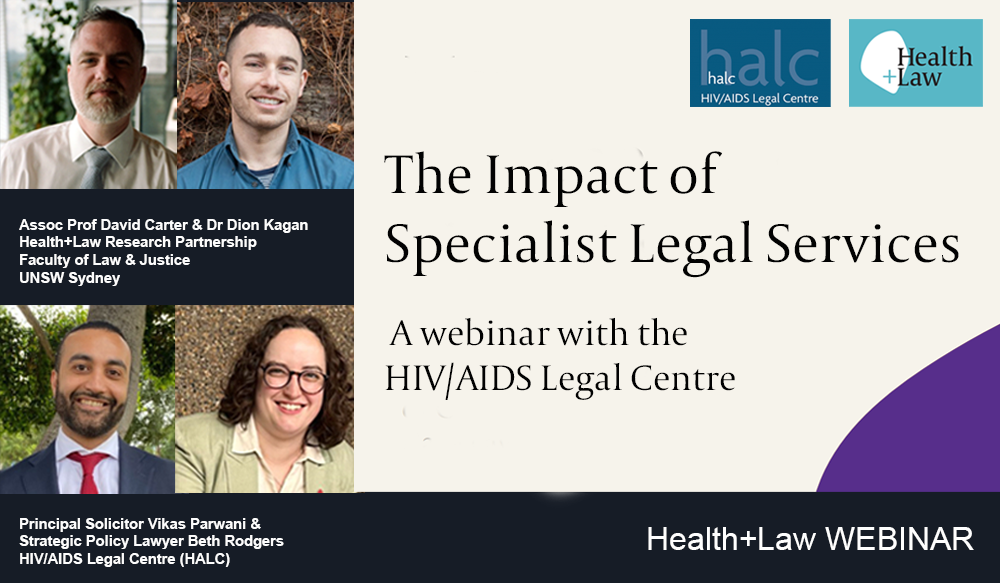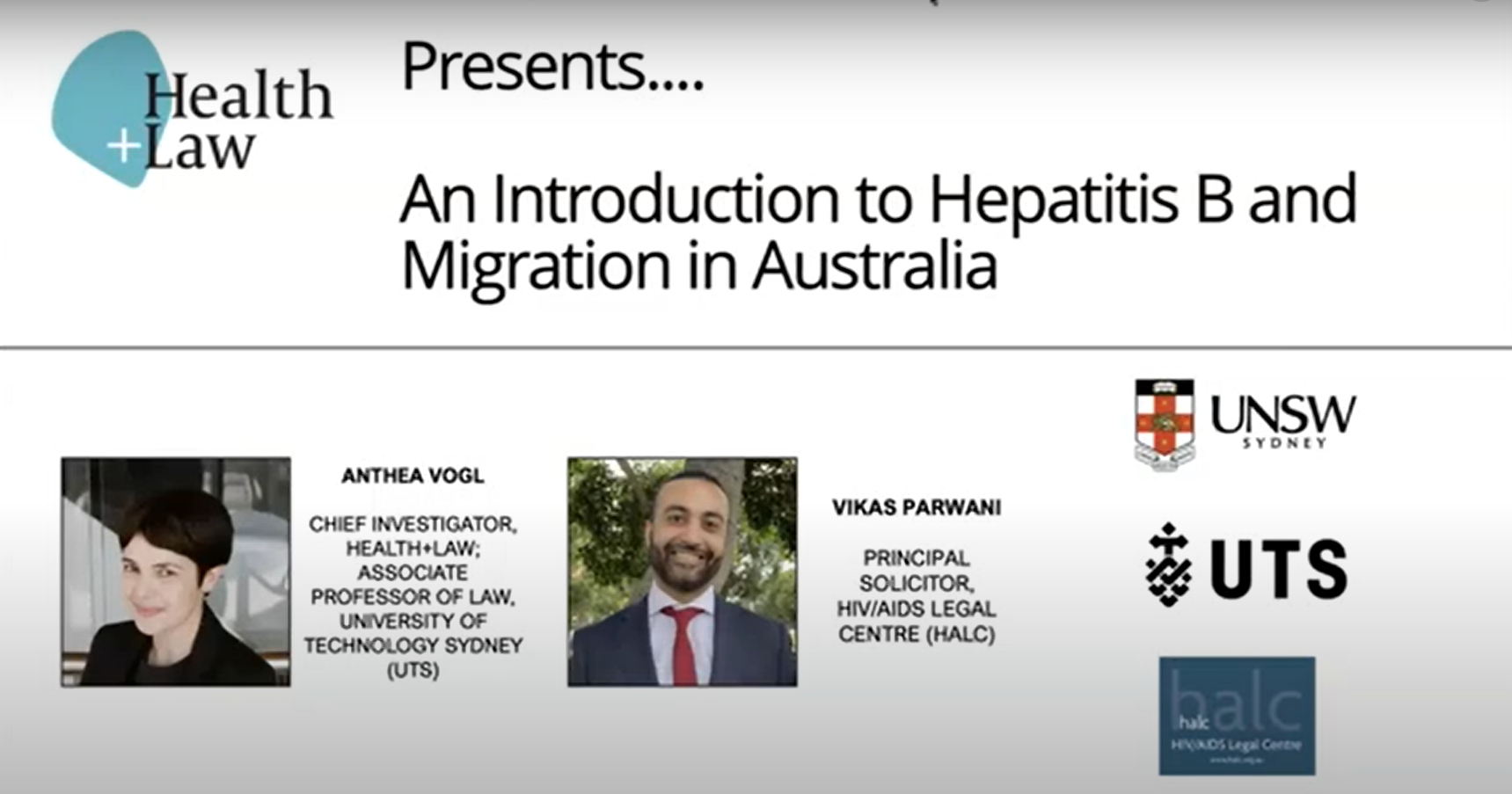New Health+Law Webinar Profiling the Impact of the HIV/AIDS Legal Centre
Since 1992, the HIV/AIDS Legal Centre (HALC) has been providing free legal services to people facing HIV- and hepatitis-related legal matters. HALC also plays a broader role in the constellation of community and health organisations that support and serve people living with blood-borne viruses, including as a source of legal information and education, and as a leading advocate for evidence-based law reform through advocacy and strategic litigation. As Australia’s first and only specialist community legal centre for people living with blood-borne viruses, HALC is central to ensuring that people in these communities receive access to justice.
Mandatory Testing Laws in New South Wales – Ombudsman’s Report Indicates Laws are Not Working
Just as the parliament of South Australia looks to expand its existing mandatory disease testing scheme, a recent NSW Ombudsman’s report has questioned the effectiveness and suitability of a similar scheme in New South Wales.
New Publication: A Global Review of the Health-Impacts of Law on People Living with HIV
The law has a powerful relationship to health. In the case of HIV, the way law is designed and enforced can have a huge impact on preventing HIV transmissions in populations, and ensuring people living with HIV can access the care and treatment they need.
Introducing the Hepatitis B Visa & Migration FAQ
For people affected by hepatitis B, the journey through the Australian visa and migration system can be stressful, uncertain and costly. The administrative processes demanded by the health requirement and mandatory health assessments for visa applicants add an extra layer of complexity. People living with hepatitis B going through this process are often left with more questions than answers, and very little publicly available information to guide them.
HIV Justice Network Relaunches Global HIV Travel and Residence Tool: Positive Destinations
Here in Australia and abroad, activists, human rights lawyers, clinicians, public health experts and of course countless people living with HIV have been calling for the repeal of migration law and policy that discriminates against those living with HIV. However, until these discriminatory migration rules are eliminated, people living with HIV, their partners, family and those that support them, will require reliable and up-to-date information on restrictions affecting people living with HIV who want to travel, relocate or migrate.
New Webinars Mapping HIV, Hepatitis B and the Law in Australia
We are delighted to share two new webinars featuring Health+Law Research Associate Dr Dion Kagan in conversation with Health+Law Research Lead Associate Professor David Carter about our recent publications that map HIV and hepatitis B-related case law in Australia.
Interview: Joshua Borja, Positive Asian Network Australia (PANA)
In the diverse tapestry of Australia’s HIV advocacy landscape, Positive Asian Network Australia (PANA) is a unique community network run by and for Asian people living with HIV in Australia. PANA offers a vital, dedicated space for connection, support and advocacy, provides information and referrals, and runs workshops and social events.
Updated HIV Legal Website Provides Healthcare Professionals and Communities with Critical Legal Information
The Health+Law Research Partnership and ASHM Health are pleased to announce the release of HIV Legal.
HIV Legal is the only resource of its kind in Australia and is intended as a general guide on the legal aspects and ethical responsibilities of HIV care in Australia for healthcare practitioners and community members.
David Carter Delivers Keynote at the Australasian HIV&AIDS Conference
Health+Law’s research lead David Carter, delivered a keynote address at the recent ASHM HIV Conference in Sydney, exploring the controversial past and present of HIV criminalisation in Australia. His urgent, provocative address challenged us to consider how current legal and policy processes in migration law recreate conditions of criminalisation, producing serious health and other harms for people living with HIV.
New Map of HIV-related Legal Concerns Identifies Issues in Migration Law, Refugee Law and Criminal Law
When it comes to HIV and the law in Australia, the major focus of legal research and advocacy has been the operation of the criminal law in relationship to HIV. As Health+Law research lead David Carter described in a recent keynote at the Australasian HIV&AIDS 2024 Conference in Sydney, this work has been – and remains – extremely important, particularly when the criminal law is used in ways that have unintended, negative health outcomes and when it operates in tension with rights-based approaches to public health.
Australasian Viral Hepatitis Conference Hears Call to Urgently Integrate Law into the Response to Hepatitis B
For decades now, researchers and advocates have emphasised the power of law to shape both public health outcomes and the individual lived experience of communicable disease and health. This relationship between law and hepatitis B was the focus of a recent keynote address delivered by Health+Law chief investigator David Carter. ‘People living with and affected by hepatitis B are made deeply vulnerable by our current legal arrangements – both real and imagined’, David argued at the 14th Australasian Viral Hepatitis Conference, held on Larrakia country, Garamilla (Darwin) in August 2024. ‘We have a legal environment that asks too much and provides too little support.’
New Publication: Mapping the Legal Landscape Around Hepatitis B in Australia
Understanding more about how the law affects people living with hepatitis B in Australia is the key objective of our latest publication, titled ‘Hepatitis B and the Law in Australia: A Mapping Review of Contemporary Case Law’. The report, which is part of our national legal needs (LeNS) study, examines the existing legal landscape surrounding hepatitis B in Australia by focusing on where and how hepatitis B becomes relevant in formal legal processes or disputes.
Watch: Two New Webinars on Hepatitis B and Migration
Earlier this month, Health+Law hosted two webinars on hepatitis B and migration, featuring researchers from our team, members of our partner organisations and experts in hepatitis B. The first webinar introduces Australia’s migration system and provides an overview of the complexities it may pose for people living with hepatitis B who seek to migrate. The second webinar presents a wide-ranging panel discussion among key professionals and sector leaders across lived experience, community, health care, health policy, law and migration.
Research Update: Interviews with People Living with HIV and Hepatitis B Across Australia
Earlier this year, the federal Labour government announced an investment of $43.9 million to fund ongoing efforts to eliminate transmission of HIV in Australia by 2030. Efforts to end viral hepatitis by this time are also underway, with new investment of $23.7 million over two years for hepatitis B and hepatitis C initiatives. This included the first dedicated investment in hepatitis B initiatives, with a new $7.8 million commitment over two years to develop and pilot hepatitis B projects to reduce transmission. However, it has been over thirty years since the last major national review of the legal landscape surrounding HIV, and the legal challenges faced by people living with hepatitis B have never before been the subject of dedicated national research.
New Publication from the 2023 ACT NOW Forum Calls for Removal of Unjust Laws Restricting the Migration of People Living with HIV
‘We are not criminals, we are human beings’, Doreen Moraa Moracha, an HIV advocate from Kenya who was born with HIV, states. Speaking as part of a recording made at the 2023 ACT NOW Community Forum, held as part of the 12th International AIDS Society Conference on HIV Science in Brisbane, in July 2023, Moracha echoed other voices calling for an end to outdated, differential treatment of people living with HIV.
Health and Other Harms in Migration Law and Border Policy: Health+Law Reports on Australia’s Medical Border at the 2024 Law and Society Association Conference in Denver
Migrating to Australia can be a complex and intrusive experience. Reflecting on the administrative and legal process of migrating to Australia, Sergio*, a man in his thirties originally from South America and living with HIV, said:
I didn’t have to face any court, but I [did] have to prove that I wasn’t a bad person just because I have HIV […] I [had] to prove myself to someone else, who probably is not living with HIV, that I was not a bad person and I was a good citizen and I deserve to be here.
Changes to Migration Law and Policy: Improved Prospects for Permanent Visa Applicants Living with Hepatitis B
Over the past five years, there have been incremental changes to migration law and policy that have improved the prospects of people living with chronic hepatitis B becoming permanent residents in Australia. These changes include amendments to what is known as the ‘significant cost threshold’, which the Department of Home Affairs describes as a ‘cut-off amount’ at which it determine that ‘a visa applicant’s estimated health and community service costs’ are ‘significant’ and therefore do not meet the ‘Migration Health Requirement’. The time period used by the Department to estimate these costs is now 10 years for applicants who have an ongoing or permanent health condition with a ‘reasonably predictable course’. Previously, the time period was estimated against the applicant’s lifetime. For temporary visa applicants, the relevant period of time for the estimate of cost is the length of the particular visa subclass.
Judging Refugees: A New Book by Health+Law Investigator Anthea Vogl on Refugee Narratives and Oral Testimonies
Dr Anthea Vogl is an Associate Professor in the UTS Faculty of Law and a Chief Investigator in the Health+Law partnership. Her research adopts a critical and interdisciplinary approach to the regulation of migrants and non-citizens, with a particular focus on the social and legal categories of the ‘refugee’ and the ‘irregular migrant’. In her recently published book, Judging Refugees: Narrative and Oral Testimony in Refugee Status Determination (Cambridge University Press), Vogl examines the problematic reliance of decision-makers on refugee oral testimonies, which demand applicants present their personal life story in a neat and digestible Anglo-European form.
Health+Law Team Member Interview: Rhys Evans
We recently spoke to our colleague Rhys Evans about his role at Health+Law, his previous experience as the Projects, Policy and Law Reform Solicitor at the HIV/AIDS Legal Centre, and his current work as a Research Assistant and PhD candidate.
World Hepatitis Day 2024: ‘It’s time for action’
The 28th of July is World Hepatitis Day, a global campaign to raise awareness and galvanise action towards eliminating viral hepatitis.
“When research brings together the quantitative measurement of an issue with the richness and depth of qualitative conversations, we have the opportunity to enrich the debate around the specific legal and health needs of specific populations within the wider community.”
Dr James Brown, School of Mathematical and Physical Sciences, UTS





















